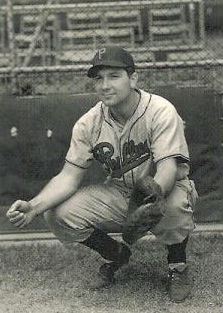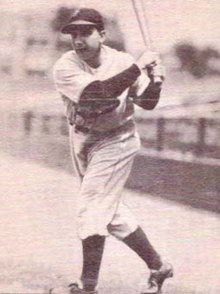 William F “Bill” Atwood was
born in Rome,
Georgia
on September 25, 1911. He graduated from
Hardin-Simmons
University in
Abilene,
Texas in 1931 and signed with Dallas of the Texas League.
William F “Bill” Atwood was
born in Rome,
Georgia
on September 25, 1911. He graduated from
Hardin-Simmons
University in
Abilene,
Texas in 1931 and signed with Dallas of the Texas League.
Atwood played with
Augusta
of the Palmetto League in 1931, and joined Baton Rouge of the Cotton State League in
1932. In 1933, he was with Birmingham
of the Southern Association and moved to
Johnstown of the Middle-Atlantic League in 1935 where he
batted .355 and finished the year with
Baltimore
of the International League. The Orioles sold the 24-year-old
catcher to the Philadelphia Phillies for 1936 and he made his major
league debut on the second day of the season (April 15) against
Boston. As a backup to Earl Grace he played
71 games and hit .302 with 29 RBIs.
The following year he played
87 games and followed with a career-high 102 games in 1938 although
his average dropped to .196. Atwood found himself with
Jersey City of the International League in
1939 but was back with the Phillies for 78 games in 1940.
Back with
Jersey City
in 1941, Atwood was signed by
Hollywood
of the Pacific Coast League in December of that year and batted .253
in 106 games in 1942. Following the season, on October 9, 1942,
Atwood enlisted in the Army Air Force.
 With 1,400 hours of flying
time already under his belt as a civilian pilot, Atwood initially
attended the Central Instructors' School
of Aviation and served as an instructor at Kelly Field
and Randolph Field in
Texas. He received his flight officer
warrant and Army service pilots wings at the graduation exercises of
the 20th Ferrying Group, Air Transport Command at the Municipal Airport,
Nashville, Tennessee
in July 1944, and became a C-46 flight officer stationed at Sookertang, India,
where he flew “The Hump" with Ferry Command. The Hump was a high
altitude military aerial supply route between the
Assam
Valley in northeastern India, across northern Burma, to Yunnan
province in southwestern
China. This operation was the first
sustained, long range, 24-hour around the clock, all weather,
military aerial supply line in history.
With 1,400 hours of flying
time already under his belt as a civilian pilot, Atwood initially
attended the Central Instructors' School
of Aviation and served as an instructor at Kelly Field
and Randolph Field in
Texas. He received his flight officer
warrant and Army service pilots wings at the graduation exercises of
the 20th Ferrying Group, Air Transport Command at the Municipal Airport,
Nashville, Tennessee
in July 1944, and became a C-46 flight officer stationed at Sookertang, India,
where he flew “The Hump" with Ferry Command. The Hump was a high
altitude military aerial supply route between the
Assam
Valley in northeastern India, across northern Burma, to Yunnan
province in southwestern
China. This operation was the first
sustained, long range, 24-hour around the clock, all weather,
military aerial supply line in history.
Captain Atwood was
discharged from service at the end of 1945 and returned to the
Hollywood Stars in 1946, but after batting just .167 in 16 games the
34-year-old became team's third base coach. In 1947, he became
player/manager of the Sherman Twins of the Big State League and was
with Ballinger of the Longhorn League in 1948.
After retiring from
baseball, Atwood owned Bill Atwood Construction, an oilfield service
contractor, in Snyder, Texas.
Continuing as a pilot, he flew pipelines and also flew many Snyder
residents to hospitals in Dallas and Houston.
Bill Atwood died in an
automobile accident on September 14, 1993 in
Snyder,
Texas. He was 81.


 William F “Bill” Atwood was
born in
William F “Bill” Atwood was
born in  With 1,400 hours of flying
time already under his belt as a civilian pilot, Atwood initially
attended the Central Instructors'
With 1,400 hours of flying
time already under his belt as a civilian pilot, Atwood initially
attended the Central Instructors'